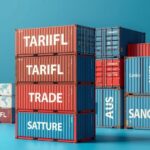Bangladesh Textile Industry Faces Challenges Due to US Tariff Increases
The Bangladeshi textile industry is under severe threat due to a substantial increase in US tariffs imposed by President Trump, affecting cotton and polyester products. Industry leaders are apprehensive about potential loss of buyers as competition intensifies. The government is seeking solutions to mitigate the impact of these tariffs, while the industry continues to play a crucial role in the nation’s economy.
The Bangladeshi textile industry is feeling the impact of recently imposed US tariffs, which industry leaders deem a “massive blow” to their sector. As the world’s second-largest garment manufacturer, Bangladesh relies heavily on this industry, which constitutes approximately 80 percent of the nation’s total exports. Rakibul Alam Chowdhury, chairman of RDM Group, emphasized that the rising costs would lead to a loss of buyers, as they shift toward more cost-effective markets.
In a recent move, US President Donald Trump increased tariffs on Bangladeshi goods, raising the duty rates from 16 percent to 37 percent for cotton and from 32 percent for polyester products. The Bangladesh Garment Manufacturers and Exporters Association (BGMEA) reported that Bangladesh exports garments worth $8.4 billion annually to the US, making up About 20 percent of its total ready-made garment exports.
Anwar Hossain, administrator of BGMEA, stated, “We were not ready for this,” reflecting the industry’s sudden challenges. However, he noted that Bangladesh remains in a better position compared to competitors such as China and Vietnam, who face higher tariffs. Chowdhury highlighted that a substantial portion of the US exports from Bangladesh consists of cotton cloth.
In response to the crisis, Shafiqul Alam, press secretary for interim leader Muhammad Yunus, affirmed that the government is actively seeking solutions. The National Board of Revenue is in the process of exploring options to rationalize tariffs swiftly to mitigate the adverse effects on the country’s garment sector.
Bangladesh is a significant player in the global garment industry, producing for renowned brands like Carrefour, Uniqlo, Primark, H&M, and Zara. Although the industry faced severe disruptions during political unrest in August 2024, it still managed to achieve earnings of $36 billion, only slightly down from the $38 billion reported in the previous year.
The Bangladeshi textile industry is confronting significant challenges due to increased US tariffs. With a critical reliance on garment exports, industry leaders are concerned about losing market share to more competitive countries. Despite the adverse situation, the government is taking proactive measures to address the tariff issue. Overall, the resilience of the industry could be tested further amid these economic pressures, but it remains vital for the country’s economy.
Original Source: www.malaymail.com






Post Comment